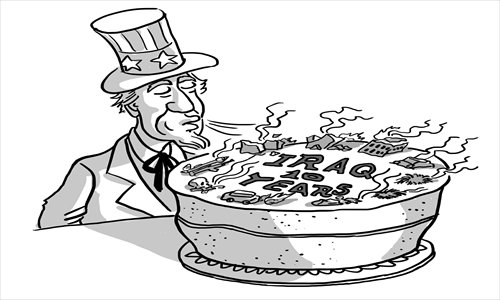Ten years on, Western leaders have learned nothing from Iraq disaster

Does the 10th anniversary of Washington's Iraq War mean anything to the leaders who took us into war? No. Because, so far, there has been no indication that they have learned any lessons.
Then US president George W. Bush and UK prime minister Tony Blair lied to their respective government and people in order to launch the regime change war. Utterly false reports about weapons of mass destruction and other non-existent threats were used to dupe Americans, Britons, and the world.
Today, the Iraq War is a fading memory in the US, and the Americans have yet to comprehend the extent to which the war has stolen their future through some $5 trillion of unnecessary war costs and untold damage to Washington's reputation.
Despite these facts, US politicians do not hesitate to advocate regime change wars against Syria and Iran.
The US public, influenced by jingoist corporate news media, does not relate the disaster in Iraq to the present US intervention against Syria, let alone to a possible war against Iran.
About three quarters of Congress voted to authorize Bush to use force against Iraq. Today the percentage would be at least as high, if not higher, for regime change wars against Syria and against Iran which many politicians openly and stridently call for.
Petroleum-rich Iraq was created by the British Empire after World War I following the secret Sykes-Picot Agreement to divide the spoils of that war in the Middle East between Britain and France.
Iraq as such never existed in history. London simply amalgamated three former Ottoman provinces, to make up an "Iraq" state. These were Mosul, Baghdad, and Basra. The British placed a friendly king in charge of the Iraqi state while placing his brother in charge of Jordan.
Britain's strategic reasoning was simple. Because Iraq was petroleum-rich, it could serve the empire's interests.
Petroleum in southern Iraq could be refined and then accessed via the Persian Gulf. And petroleum in northern Iraq could be conveyed by pipelines to the Mediterranean Port of Haifa and refined there to support the British fleet.
Britain's support for Zionism in Palestine had a strategic reason as well as a domestic political reason. The strategic reason related directly to securing the Port of Haifa as the terminus for Iraqi petroleum products.
Almost a century later, Washington followed in London's footsteps in Iraq.
Proponents of the regime change war cited two specific objectives: protection of Israel and access to hydrocarbon resources.
Protection of Israel was seen as bringing into being a regime in Iraq which would establish formal peaceful relations with Israel. If not, proponents argued, Iraq could be roughly divided back into its three former Ottoman-era parts thus neutralizing any threat to Israel from a strong unitary state.
In either case, proponents of the war argued that Israel would be well served.
Today, the same proponents of regime change war against Iraq now argue for regime change war against Syria and Iran.
Most see war against Syria as an opening gambit for a broader war against Iran. Because Syria is an ally of Iran, they say, eliminating it as a strategic factor in the region facilitates regime change in Iran.
But the regional situation is complex today and changing. So far, Damascus has stalemated the Anglo-French war against it. Saudi Arabia and Qatar support a combination of Muslim Brotherhood and Al Qaeda terrorist organizations fighting in Syria, while the US behind the scenes encourages the use of such groups as a necessary evil to promote regime change.
Instability is now spreading throughout the Middle East and North Africa.
Iraq itself is confronted daily by terrorist organizations supported by Saudi Arabia. So it maintains friendship with Iran as a counterbalance. Jordan is making adjustments involving closer ties with Iraq and thus indirectly with Iran. Tension is rising in Lebanon.
Only a fool would argue that Washington has learned any appropriate lessons from the Iraq War.
The author is an educator and former senior professional staff member of the Senate Committee on Foreign Relations. opinion@globaltimes.com.cn